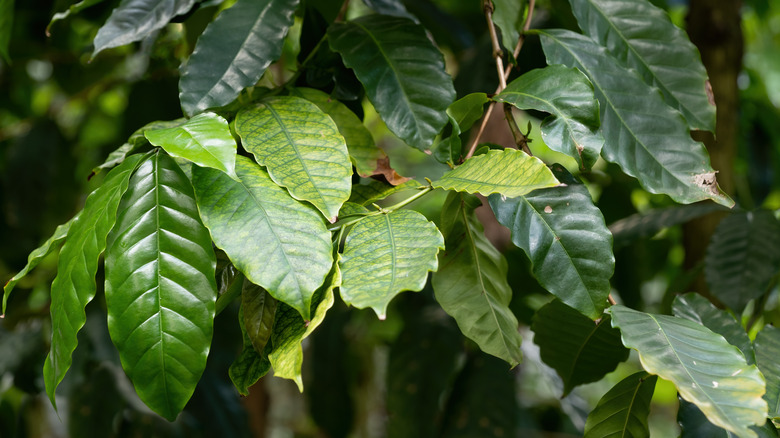This 'Lost' Coffee Species Was Recently Rediscovered
Although the average consumer has a wide range of options when stepping into a coffee shop, choosing among species of coffee beans isn't usually one of them. Thanks to a recent discovery in Sierra Leone, a nation in West Africa, a species of coffee that had seemingly disappeared could soon gain importance in the java industry. Coffea stenophylla was popular in the 1800s and at the start of the 1900s, but The National Post explains that it soon became replaced by two other species, robusta and arabica. The source reports that there are over 100 coffee species, but these two count for 99% of coffee consumed. Stenophylla's official rediscovery was documented in a research paper published in Frontiers in Plant Science in 2020.
The lead researcher Aaron Davis had previously written about the possibility of arabica becoming extinct by the end of the century (via Royal Botanic Gardens). This worrisome prospect led him to seek out other potential species that could take over when arabica disappears. According to The National Post, Davis and fellow researchers went to Sierra Leone where the stenophylla species was once grown and shared photos of the plant with farmers in the hopes of tracking it down. Fortunately, researchers were able to find the species in sufficient numbers for their purposes. The research group led by Davis were not alone in examining stenophylla as an alternative, and The National Post notes that scientists on the Réunion Island in the Indian Ocean had been studying the species in a lab.
Is it any good?
The teams joined forces, focusing efforts on identifying whether stenophylla could be a suitable replacement for arabica and robusta in the long run. In their most recent paper published in Nature Plants in 2021, the scientists reported that the species was capable of thriving in higher temperatures than arabica. Moving forward, they asserted this was important to consider given the changing climatic conditions worldwide.
Aside from the agricultural considerations, flavor was an essential element to examine, and the study results indicate favorable qualities. The researchers compared stenophylla to a high-quality arabica coffee, which certainly bodes well for its future. Among the flavors, The National Post reports that researchers described "a natural sweetness, good body (mouthfeel), and complex tasting notes, including blackcurrant, caramel, chocolate, elderflower, jasmine, honey, light black tea, mandarin, nuts, peach, and spice."
CNN reports that the discovery could be beneficial for Sierra Leone's economy, which faced a huge drop in the coffee industry during its civil war at the end of the last century. Hannah Tarrawally, a Sierra Leonean who established one of the first local coffee production businesses and cafes, tells CNN that times are changing. While she hopes to export her products internationally, she views the local market as significant in the growth of the Sierra Leonean coffee industry. Chances are you won't be able to order a coffee made with stenophylla beans at Starbucks just yet, but the species should find its way into the international market in due time.

